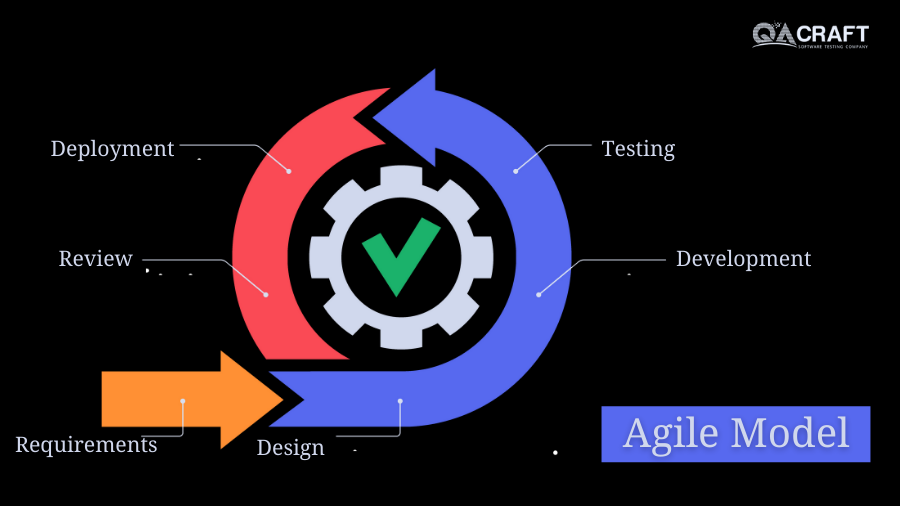06 May

Agile refers to something that is quick or adaptable. A software development approach based on iterative development is referred to as an “agile process model.” Agile approaches divide projects into smaller iterations or sections and avoid long-term planning. The scope and requirements of the project are defined at the start of the development phase. The number of iterations, duration, and scope of each iteration are all clearly determined ahead of time.
Agile modeling is a strategy for demonstrating and documenting programming frameworks in light of best practices. It is a collection of values and standards, that can be applied to a programming development project.
What is agile?
The agile model is additionally a sort of Incremental model. Programming is created in gradual, fast cycles. This outcome in little gradual deliveries with each delivery expanding on past usefulness. Each delivery is completely tried to guarantee programming quality is kept up with. It is utilized for time-critical applications.
Phases of an agile process model
 The stages of the agile process model are as follows:
The stages of the agile process model are as follows:
- Requirements gathering
- Design the requirements
- Construction/ iteration
- Testing
- Deployment
- Feedback
Read in the brief about the SDLC process model:
1) Requirements gathering
In this phase, requirements should be characterized. Different business opportunities are explained and for the building of the project efforts and time are planned.
2) Design the requirements
At the point when you have distinguished the task, work with partners to define the requirements. You can utilize the client stream graph to show crafted new elements and show how they will apply to your current framework.
3) Construction/ iteration
At the point when the group characterizes the requirements, the work starts. Creators and designers begin to work at their task, which means sending a functioning item. The item will go through different phases of progress, so it incorporates easy minimal functionality.
4) Testing
In this stage, the Quality Assurance group analyzes the item’s presentation and searches for the bug.
5) Deployment
In this stage, the group gives an item for the client’s workplace.
6) Feedback
When a product is released, feedback is the last step. Feedback is received regarding the product and manages the input.
When to use an agile model?
- To execute a new feature, the developers need to lose just crafted by a couple of days, or even just hours, to move back and carry out it.
- At the point when new changes are required to have been carried out. The freedom agile provides for change is vital. New changes can be carried out at almost no expense on account of the recurrence of new augmentations that are created.
- End clients’ requirements are truly changing in a powerful business and IT world. Changes can be examined and elements can be affected. This really gives the client the completed framework they need or want.
Pros and Cons of the Agile Model
Pros:- Advances teamwork and broadly educating.
- Usefulness can be grown quickly and illustrated.
- Conveys early fractional working arrangements.
- A great model for conditions that change consistently.
- Asset requirements are minimum.
- Not appropriate for handling complex conditions.
- There is an absence of emphasis on vital planning and documentation.
- If the client requirement is not clear, chances are that project can easily get taken off track.
- Just senior software engineers are fit for taking the sort of choices expected during the improvement cycle. So it has a bad situation for junior software engineers unless combined with experienced assets.

Conclusion:
The Agile Development strategy is the reworked way to deal with programming item improvement that focuses on adaptability and speed. A large portion of the computerized items today is made utilizing the Agile advancement strategy.
Read Also:
Risha works as a QA engineer at QACraft. She is a computer science engineer and has 2+ years of experience in manual and automation testing. In her free time, she loves to indulge in books and make paintings
Related Post
Categories
- Agile Testing
- Agile Testing
- Android App Testing
- Automation Testing
- Banking Domain Testing
- Beta Testing
- cloud testing
- Corporate Life
- cross browser testing
- Cypress Testing
- Cypress Testing
- desktop testing
- Domain Testing
- E-commerce Website Testing
- E-learning App Testing
- Functional Testing
- Game Testing
- Healthcare Domain Testing
- Infographics
- Ios App Testing
- Jenkins
- JIRA
- Katalon
- Manual Testing
- Mobile App Testing
- monkey testing
- Performance Testing
- Regression Testing
- Salesforce Testing
- security testing
- Selenium
- Selenium
- Software Testing
- static testing
- Test Environments
- vdfv
- Web Application Testing
© Copyright 2024 QACraft Pvt. Ltd. All rights reserved.
Contact : +91 9157786796



Risha Bhat